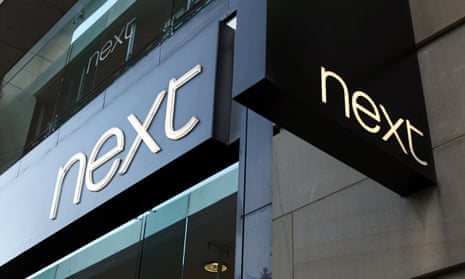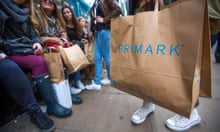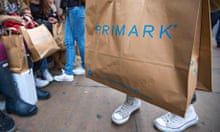Next has warned annual profits will be lower than expected after unseasonably warm weather deterred shoppers from buying coats and knitwear.
The warning by one of Britain’s most successful retailers prompted fears of falling profits across the high street as fashion chains are forced into discounting to clear unwanted stock ahead of Christmas.
Next said sales rose at about half the rate it expected in the three months to the end of October and warned that the following three months were also likely to be less buoyant than previously expected.
The retailer’s shares slid 1.5% early on Wednesday, dragging down shares in rival groups including Marks & Spencer, Debenhams, Supergroup and Ted Baker, as investors worried about the impact of the weather on their trading. Next shares regained ground later in the day.
Nick Bubb, an independent retail analyst, said: “If Next have been mildly discomfited by the amazingly mild October weather, we suspect that the likes of M&S and Debenhams have had bigger problems.”
Fashion chains including Marks & Spencer, House of Fraser and New Look started offering discounts to lure customers in to stores only weeks after the new season’s stock arrived on the shelves.
Simon Wolfson, Next’s chief executive, said: “Looking at the market I don’t think anyone will be surprised by what we’ve said today.”
The profit downgrade came after Next sent a shudder through fashion retailers at the end of September when it said summer-like temperatures had hit sales of winter items. It warned that if warm weather carried on it could be forced to cut profit forecasts. As the warm weather did continue, Next’s sales rose by 5.4% against its original hopes of more than 10%.
Lord Wolfson admitted that Next had been over optimistic about the prospects for the autumn after a enjoying very strong trading in August. “In hindsight we underestimated how much the weather was helping us in the summer and didn’t anticipate it would be this warm now – 20C at the end of October is unusual.”
He said the volatility in sales, with big falls throughout September and then increases in October suggested that Next’s problems were caused by the weather rather than any problems with product or a sudden drop-off in consumer confidence. Wolfson added that the big falls in sales in September after big increases in August also demonstrated how shoppers’ behaviour had changed so that they only bought clothing when they really needed it. “The day we sell coats is the day after it gets cold. Nobody goes out and buys a winter wardrobe these days,” he said.
Next cut its full-year profit expectations by about 3% to between £750m and £790m. That would still be an increase of between 8% and 14% on the previous year. Its top-of-range guidance was £815m early last month.
Analysts raised concerns that the slow pace of sales would mean that many retailers could be forced into heavy discounting to clear stock ahead of Christmas. “For all that many [retailers] will have vowed to hold their nerves and not discount too soon this year, the pressure may be too much for some and we foresee a not dissimilar promotional Christmas emerging this year to last,” said Jonathan Pritchard, an analyst at Oriel in a note.
Wolfson said Next would not discount outside its usual sales days and he did not believe the market was any more promotional than last winter. “There was a huge amount of discounting going into Christmas last year and I’m not sure there will be any more this year. It doesn’t depend on how retailers are performing but how heavily they have bought stock for autumn winter and we don’t know that,” he said.
September was the driest since records began in 1910 and one of the warmest. It followed an unusually wet August, which gave Next and other clothes retailers a good start to the new season but sales of coats and other winter goods have been tough since as many parts of the country have basked in warm sunshine.
Next said that after returning £361m of surplus cash to shareholders, including £223m through special dividends, it does not plan to pay out further special dividends this year. It has made £138m of share buybacks this year and has the scope to buy more shares in the market though not above the top price of £64.25 paid to date.





Comments (…)
Sign in or create your Guardian account to join the discussion